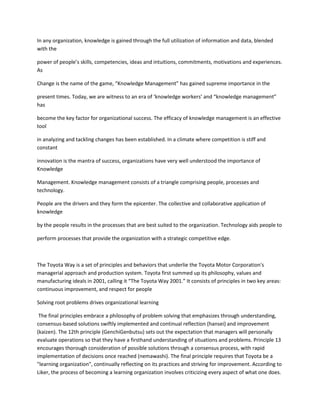
Make 2011
- 1. In any organization, knowledge is gained through the full utilization of information and data, blended with the power of people’s skills, competencies, ideas and intuitions, commitments, motivations and experiences. As Change is the name of the game, “Knowledge Management” has gained supreme importance in the present times. Today, we are witness to an era of ‘knowledge workers’ and “knowledge management” has become the key factor for organizational success. The efficacy of knowledge management is an effective tool in analyzing and tackling changes has been established. In a climate where competition is stiff and constant innovation is the mantra of success, organizations have very well understood the importance of Knowledge Management. Knowledge management consists of a triangle comprising people, processes and technology. People are the drivers and they form the epicenter. The collective and collaborative application of knowledge by the people results in the processes that are best suited to the organization. Technology aids people to perform processes that provide the organization with a strategic competitive edge. The Toyota Way is a set of principles and behaviors that underlie the Toyota Motor Corporation's managerial approach and production system. Toyota first summed up its philosophy, values and manufacturing ideals in 2001, calling it “The Toyota Way 2001.” It consists of principles in two key areas: continuous improvement, and respect for people Solving root problems drives organizational learning The final principles embrace a philosophy of problem solving that emphasizes through understanding, consensus-based solutions swiftly implemented and continual reflection (hansei) and improvement (kaizen). The 12th principle (GenchiGenbutsu) sets out the expectation that managers will personally evaluate operations so that they have a firsthand understanding of situations and problems. Principle 13 encourages thorough consideration of possible solutions through a consensus process, with rapid implementation of decisions once reached (nemawashi). The final principle requires that Toyota be a "learning organization", continually reflecting on its practices and striving for improvement. According to Liker, the process of becoming a learning organization involves criticizing every aspect of what one does.
- 2. TATA organization’s strategy (Figure-1.4) ensures creation of value for all its stakeholders and contributes towards achieving sustainability goals. The strategy addresses stakeholder concerns (including that of shareholders) through creation of wealth, customer & suppliers focus on achieving world-class service & products and achieving cost leadership. It addresses the employee and community concerns through its desire to create a learning organization and leadership in corporate citizenship. Deployment of strategy is through focus on lead and lag indicators: • Creation of wealth includes improvement in shareholder value, growth in top line that is driven by EVA; Turn Over, EBIT and profitable growth. These in turn are dependent on WACC, net realization, and working capital efficiency. • Achieving world-class status in service & product through enhancement of customer relationship, operational excellence and customer satisfaction, which are driven by despatch/delivery compliance, product development and cycle time, complaint resolution time, enhancement of the buying experience and development of long-term partnership. • Cost leadership by becoming the lowest cost producer and through reduction in family size. This will be achieved through increase in productivity, decrease in post manufacturing expenses, which inturn are driven, by rightsizing, energy and resource conservation and reduction in cost of procurement. • Creation of a culture of continuous learning and change through emphasis on development of a knowledge based and happy organization, culture of excellence and attracting and retaining talent. This is dependent on recruitment, training and development and implementation to HR plans. • Industry leadership in corporate citizenship through environmental management, knowledge management, community care and creation of mechanism for learning and sharing across the organization.
